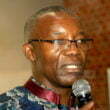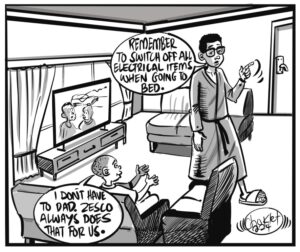Premier Consult Limted executive director Professor Oliver Saasa has questioned government’s continued intimidation of the Financial Intelligence Centre (FIC) over revelations contained in its latest Financial Trends report.
And Prof Saasa has observed that FIC director Mary Tshuma is being treated like she has commited a bigger crime than the thieves whom she has exposed.
Prof Saasa told News Diggers in an interview that he did not understand why government was insisting that the centre erred when it published its 2017 trends report.
“It’s amazing that much as if somebody says legislation does not allow the FIC to disclose, fair enough, of course I will go for legislation change. But let’s just assume that that’s what it is and that they (FIC) erred, what surprises me is that the serious allegations they revealed should raise eyebrows and people should actually have questions now. But I listened to the Government Spokesperson Dora [Siliya] where they were saying people were named and therefore… and some funny lawyer even said the FIC must apologise to those that were named,” Prof Saasa said.
“Now, if there are allegations, and that is what happens even in the Auditor General’s report, the revelations ought to be followed up and those that are found wanting should be convicted. When there is a very serious problem and someone is accused, the Zambian law says ‘you are innocent until proven guilty’. But of course if you are arrested, of course it will be in the interest of the public domain and they will know about it. When it goes to court, still someone is innocent until proven guilty by the courts of law. So you cannot speak like the [government] Spokesperson did that until they are convicted that’s when you can take it into the public domain because the logic of our law does not expect that.”
Prof Saasa explained that with the current technology, even if the FIC does not publicly announce its findings, people would still locate the report and circulate and it.
“Reports are reports, that’s why when we talk about the Access to Information bill, it’s so important to realise that let’s not emphasise on processes. Let’s not be more concerned about the process of how the information is disclosed, let’s look at the substance. If somebody has revealed that somebody is about to steal but he doesn’t have sufficient information but he alerts the public and the law enforcement takes position to make sure that we avert the calamity, then you say ‘no you cannot disclose things like that even if someone wants to commit a crime’. I think for me it makes me wonder how far we have gone astray in terms of appreciating the value of disclosure,” he said.
“Now, for right thinking citizens, when someone is named in a report like that, if they ask me, I would say yes this is an allegation but am interested in knowing about it. But I would fail to understand someone who says ‘no, you should not even know about the potential crime that has been committed by individuals until they have been convicted’, which really is Dora or government’s position. The question then becomes, at what stage should the public know? My take is if the law appreciates that the FIC should not disclose it’s findings, my position immediately would be, that provision of the law should be revised.”
Prof Saasa wondered why government was only concerned about reports produced by the FIC when there were several other entities doing the same work.
“Look at what happens to the parliamentary Public Accounts Committee (PAC). PAC has no investigating authority and it does not even convict. But many times, that committee sits in public domain and we hear the challenges they put across to the permanent secretaries and they really do reprimand and we do read the headlines, so what is the difference with the work that the FIC does? I don’t understand it because those are accusations and FIC is not saying that those people are guilty. But they are saying ‘from our investigation we have revealed the following’. But if someone says ‘don’t mention that’, then where are we heading? If the provision is like that in the law, then for God’s sake let’s remove it,” Prof Saasa said.
“I haven’t looked at the piece of legislation but I have heard debates actually that they are allowed to disclose and I am surprised that it’s not only this year. I know last year they released the report and we didn’t get these concerns because this has been the trend. How come last year it was okay? Or has the Act just been amended? If indeed the FIC is not supposed to disclose their reports, my view is that they should. And Parliament must immediately recognise that if we are serious about corruption, money laundering, about financial crimes, then those that are found wanting must be named and shamed. When they are named and shamed and ultimately they are convicted, then of course they would face the truth. The problem that we have is that if you are not revealing this and you only depend on private secretly leaking them to the law enforcers and then they are not reacting then what happens? The public will never know the truth.”
Prof Saasa asked those accusing the FIC of having done something illegal to take into consideration the work done by Auditor General.
“Look at the Auditor General’s report. What’s the difference between the FIC and the Auditor General’s report? The Auditor General does not convict and the Auditor General does not have prosecution powers by the way. His reports are presented to the Public Accounts Committee. So even the Auditor General’s are actually allegations if you like but they are raising very fundamental issues that must be investigated. And you remember last year when the President came to the challenge of ‘fire them, fire them’, he said ‘refer them to the law enforcement agencies’. So in other words, the President also recognises that even the Auditor General’s report raises fundamental issues that can only be confirmed through securing a conviction and yet the Auditor General’s report is made public. So what’s the difference between the FIC’s revelations and those of the Auditor General? Someone has to answer me and has to give me a very convincing reason why someone believes that the revelations coming from the FIC must be hidden from the public,” Prof Saasa demanded.
He predicted that the FIC chief Mary Tshuma would be fired because her work had unsettled government.
“I am just waiting to hear that the Director at FIC has been fired because the way I am hearing this it’s like she has committed a bigger crime than those that have stolen. So for me, I think we just have to be honest with ourselves as a country. I believe that there are issues that have been raised in the Auditor General’s report and there are also issues that have been raised in the FIC report that have been repeated several times and we have never seen positive action from the law enforcement agencies and the public should not be stopped from knowing what’s happening,” said prof Saasa.












